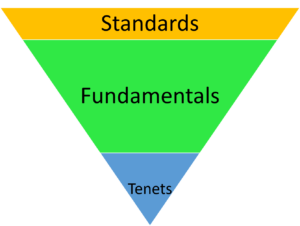Industry Principles and Standards (Lesson 25)

Shifting from economic-wide factors that impact market price to industry-wide standards is essential, with understanding and creating decision models for investment with a pool of similar companies. Industry standards are a part of the spectrum of business principles. This spectrum starts with tenets, universal rules that can not be broken by anyone in business. With value investing, the focus is on the primary business tenet of buying low and selling high. It is an undeniable requirement to increase one’s wealth. The spectrum moves towards core business principles that sometimes are not universally applicable. The final set is industry standards. Each industry has its own unique set of principles it must follow to be successful. Some are a function of law, others are driven by consumer expectations or the culture of the industry. For value investors, understanding this dynamic set of standards for each industry drives the holistic thinking of effective investing.
Value Investing – Industry Standards, A Pyramid of Principles
There is no universal finite set of business principles. In the aggregate, there are over several hundred of them. Many of them do not apply to every industry; on the contrary, many are specific to a unique business or industry. The best approach to understanding business principles is to look at this in a holistic manner, i.e., overall doctrine, down to a few rules specifically designed for that one business.
In effect, think of business principles as an inverted pyramid. The base of the pyramid consists of business tenets, common universal principles. Tenets support the next level, fundamentals. Fundamentals are the more common thoughts that most business managers use to govern their operations. However, some of these fundamentals do not apply to all corporate operations. At this level, there begins the separation of the tenets of business based on multiple variables, including markets, business sectors, and the underlying industries, customers, employees, and vendors. In many cases, this level of the pyramid is impacted by law based on the various levels of our government system. The final tier supported by fundamentals is called standards. This level of principles involves customs, guidelines, rules, and procedures.
Look at this depiction:

Notice that tenets are relatively few; again, they are universal and applicable across all industries. Fundamentals are the bulk of the principles that exist. The reason for this is that many fundamentals are set by economic restrictions and law. The final upper tier is industry and business-specific principles and is uniquely defined by the sector and industry.
This article is merely an introduction to the pyramid; other articles on this site go in-depth, related to each of the tenets of business and, of course, fundamentals. Many of the standards are located in the pool of investments of this site and often include the respective accounting processes and operational issues the industry uses to implement the fundamentals.
To illustrate, a tenet of business is cited. The fundamentals of its importance are compared and contrasted using two different business operations. The comparison does not cover all the standards for each of the two business operations, but just identifies one or two standards they each may use to comply with their respective fundamentals.
Tenets
Principles that are universal to all businesses are tenets of business. If any single business or industry can operate without this tenet or can break this principle, then this principle is a fundamental and not a tenet. The principle must apply to all industries, all sectors, all aspects of operations and dealings with employees, customers, and vendors.
As an example, there is one tenet that all corporations must follow.
Efficiency and Effectiveness
Efficiency and effectiveness are the yin and yang of business. When one of these two elements is given more credence than the other element falters. The key is to balance them appropriately. This balancing act is different for every industry and is customarily driven by the respective purpose.
Efficiency refers to utilizing the least amount of resources to deliver the product or service. Intuitively, many companies focus on efficiency as this reduces the overall cost, allowing for a profit on the bottom line. Effectiveness refers to delivering the correct product or service. Without it, the customer is highly unlikely to purchase again in the future. Every company must weigh these two elements in delivering the product or service. Using poor quality parts or resources to reduce costs (increasing efficiency) and the company increases the risk of being ineffective in delivering the product or service.
Remember, though, certain industries will place more value on one element over the other, as the other element may not be as valuable to the customer. For example, think of a medical surgeon. Undoubtedly, a surgeon needs to be effective; many people will say no matter the cost. However, this isn’t true. You see, the surgeon is bound by the hospital’s need to exercise efficiency to keep costs down in order to comply with insurance company restrictions. Furthermore, many families simply cannot afford to pay for an open-ended arrangement to be effective with the surgery, no matter the cost. As the importance of one element increases, the other can give, but there are limits.
On the flip side are businesses that place a lot of emphasis on efficiency and less on effectiveness. However, they must still deliver the product or service the customer demands.

A good example is the electric utilities business. Efficiency, both scientific and administrative, is necessary to keep costs under control. For them, every step of the process requires efficiency to reduce costs. For the consumer, they are only interested in having the source of energy at 120 volts, 60 Hertz. Thus, it is easy for an electric utility company to be effective, but difficult to maintain efficiency. Thus, the emphasis is on efficiency over effectiveness.
This efficiency/effectiveness tenet exists across all business sectors and industries. However, the fundamentals will be different, tied to the respective sector and industry.
Fundamentals
Fundamental principles are not always universal. For some industries, certain principles are solely theirs. That same principle may not apply to another industry. For example, there is a principle in business known as the range of production. Its basic definition states that a business should produce products at the maximum point of production (think of a manufacturing plant) to maximize profits. This principle assumes all products produced will be sold in the market.
![]()
The range of production is a key business principle used in many business sectors and industries. The mere fact that the principle has a restriction, ‘… assumes all products produced will be sold…’, makes it a fundamental principle and not a tenet.
This principle is utilized with the following industries:
- Consumer Products Manufacturing
- Food Production
- Service Sector
However, this principle does not apply to some businesses.
As stated earlier, one of the common restrictions related to fundamentals is government regulation. A good example is the new marijuana industry. Although demand exists, state governments (specifically California, Colorado, and Massachusetts) have set limits for production and restrictions on operating retail stores. Thus, this fundamental does not apply to this particular industry. Since the range of production principles is not universal, it is considered a fundamental principle and not a tenet.
Going back to the two businesses used above for the efficiency and effectiveness principle, the fundamentals related to this tenet are going to be different. For the utility company, since efficiency carries greater regard, its business fundamental principles are focused on this tenet. For example, their efficiency issues will be science-driven with the production of electricity and distribution to the end-user.
As for the surgical business, its fundamental principles are focused on effectiveness. Some of their business principles may cover:
- Proper Diagnosis (Hiring of Qualified Staff)
- Acquisition of Lab Results promptly
- Patient Evaluation (Good Timing and Potential for Best Results)
Don’t misunderstand, the doctor’s office still has to practice some efficiencies to control costs and ultimately generate profits for the medical partners. But the overall business principles they use will defer to effectiveness over efficiency.
What is really fascinating is that each business will create its standards, most often mimicking other similar businesses. These standards are not as encompassing as fundamentals; they are focused on one or two elements of the overall operation. Since most operations have hundreds, sometimes thousands of different elements to conduct business, standards can and are often voluminous for business operations. Think of all the manuals some companies follow to conduct business.
Standards
Many industry standards are tied directly to higher-level fundamentals, and a few are generated as a direct result of a business tenet.
Think of the surgery practice; their standards are oriented towards effectiveness in helping their patients get healthier. The clinical staff must have appropriate credentials, and all operational practices are designed to maximize effectiveness from proper specimen draws to cleanliness. It’s about being effective.
Whereas with the utility supplier, standards are focused on efficiency. Something as simple as safety reduces downtime for the utility operation. Thus, standards are put in place to create uniformity and consistency across the entire organization to maximize uptime with the production of electricity.
Even their financial standards are set against the industry standards for just about every aspect of production. Think about:
- Raw Resources Consumption and Energy Output
- Distribution Systems and Maintenance
- Business Ratios
- Proper Debt Financing
The financial standards used with utility operations are significantly different from those for the medical practice. One is a conglomerate, whereas the surgical operation is most likely a partnership. Their legal structures, operating management team, and insurance principles will be completely different.
Summary – Industry Principles and Standards
Every form of business operates under different standards. However, many businesses still utilize similar fundamentals, but one industry or sector may exercise more fundamentals or different ones depending on the various forces that guide them. But there is one set of universal principles known as tenets. Here, all businesses have to follow these tenets as no one is exempt. With this understanding of the various levels of the pyramid of business principles, the reader can begin to understand that there are hundreds of business principles out there. Use the above as guidance to help you understand your respective pool of investments. ACT ON KNOWLEDGE.
